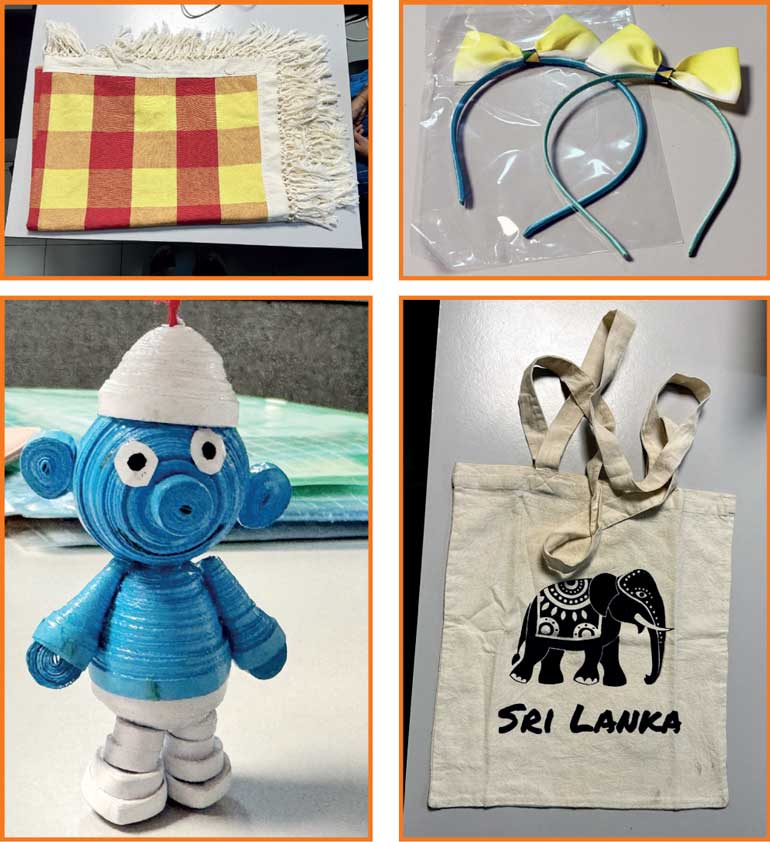Wednesday Feb 18, 2026
Wednesday Feb 18, 2026
Saturday, 16 August 2025 00:05 - - {{hitsCtrl.values.hits}}

Products of entrepreneurs with disabilities
By Randima Attygalle
‘Disability need not be an obstacle to success,’ said theoretical physicist, cosmologist, and author, Stephen Hawking. True to his words, the Specialised Training and Disability Resource Centre of the Employers’ Federation of Ceylon (EFC) headed by Manique Gunaratne, assists local entrepreneurs with disabilities to find income-generating opportunities through their own home-industries. Ranging from handicrafts, packaged food, eco-friendly products to fashion accessories, their enterprises not only reflect their skill and innovation, but also mark a step towards economic self-reliance and social inclusion. “Entrepreneurs with disabilities across Sri Lanka are demonstrating remarkable resilience, creativity, and determination in exploring their own income-generating opportunities. Yet, these entrepreneurs often face systemic barriers in reaching wider markets due to limited visibility and access to sales platforms,” says Gunaratne.
Around 8.7 % of the Sri Lankan population equalling to 1.6 million people are identified as persons with disabilities and out of this, 57% are women. The 2024 Country Report titled ‘Situational Analysis on the Rights of Persons With Disabilities in Sri Lanka,’ developed by the UNDP in Sri Lanka with technical support provided by the UN Partnership on the Rights of Persons with Disabilities (UNPRPD) points out that, persons with disabilities here at home face high levels of unemployment and poverty, compounded by limited access to education, healthcare, and employment opportunities which causes socio-economic disparities and deeply ingrained social stigmas.’ The report further notes that employment opportunities for persons with disabilities are also limited, with significant barriers to entry in both public and private sectors due to structural issues, discriminatory practices, and a lack of support services. Despite the Government initiatives for persons with disabilities including self-employment grants and recruitment in administrative and management services, opportunities for persons with disabilities are in fact limited due to the competitiveness in the mainstream job market and, in some cases, a lack of candidates meeting the minimum qualifications or experience required. ‘Although a 3% public sector job quota exists, it is often unmet, and opportunities in the private sector are even more limited. Cultural biases and employer misconceptions about necessary accommodations further restrict access to jobs,’ the report says further.
In such a backdrop, promoting entrepreneurship among persons with disabilities is no longer a choice but a necessity, maintains Gunaratne who is a promoter of inclusive economic development. She is credited for creating long-term sustainable employment and livelihoods for persons with disabilities through EFC’s Specialised Training and Disability Resource Centre which she has been heading for the past 16 years. The Specialised Training and Disability Resource Centre of the EFC was established in 2009 to train persons with diverse disabilities and enhance their capacity for employment. The Centre plays a key role in advocacy and lobbying for the rights of persons with diverse disabilities while creating long-term sustainable employment and livelihoods for them.
Promoting and including entrepreneurs with disabilities in mainstream economic activity is not just a matter of charity—it’s a smart investment in the country’s economic development, says Gunaratne. “With the right support and opportunities, these entrepreneurs can thrive, contribute meaningfully to the economy, and inspire others.” Their products such as bed linen, soft toys and accessories are also ideal as gifts for many occasions. “Especially during festive times such as Avurudu and Christmas, they can be very meaningful gifts because each purchase contributes directly to the livelihood and empowerment of individuals who often have fewer employment opportunities. Your support can help break cycles of dependency and uplift communities.”
“It is time to take action”, says the internationally reputed advocate who herself lost sight in her 20s to incurable Retinitis Pigmentosa- an inherited, degenerative disease in which the retina or the light-sensitive layer of tissue at the back of the inner eye is damaged. Today, she an ambassador of hope to thousands of people with disabilities, striving to make a better life for them.
Urging retail stores and super market chains in the country to promote products of persons with disabilities by dedicating at least a single shelf to display them, Gunaratne adds: “such a small gesture can lead to a major shift in how inclusion is practiced in the retail sector. Likewise, organisers of trade fairs, exhibitions, and public events are urged to allocate space—free or at concessionary rates—for entrepreneurs with disabilities to showcase and sell their products.” In addition to these, Local Government authorities and chambers of commerce can also support by creating inclusive vendor programs and accessible microfinance schemes, she says. Corporate entities could also partner with organisations supporting entrepreneurs with disabilities to provide mentorship, marketing support, and product-development training. Community-level ‘Disability-Inclusive Bazaars’ or ‘Empowerment Markets’ can further provide regular platforms for visibility and sales, she points out. “If Sri Lanka is to fast track its economic growth, it is imperative to include everyone in that journey so that an equitable and an empowered society is realised in which nobody is left behind.”
For purchases and trade opportunities contact Manique Gunaratne on [email protected] / 0779571918